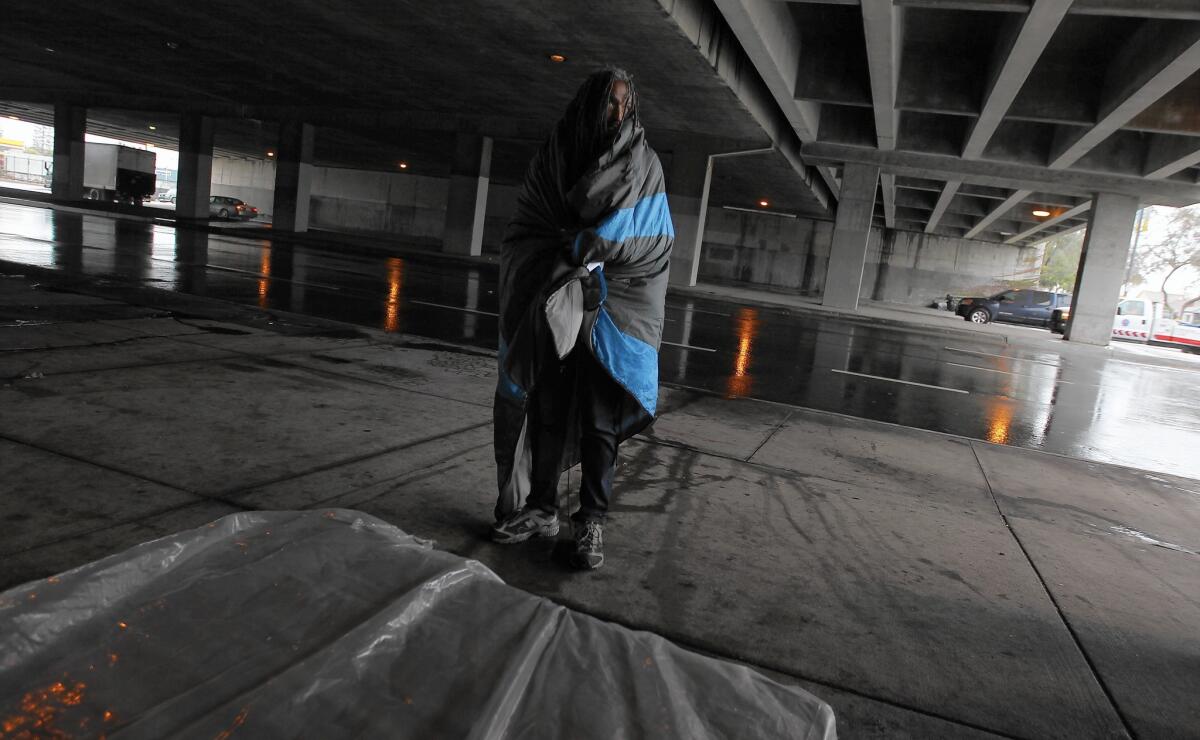Will new plans to end L.A. homelessness be fully funded?

- Share via
The mayor of Los Angeles stood with county leaders and called for eliminating homelessness in 10 years.
“We’re not here to say how we can manage the problem better or make it less of a problem but to come up with a plan to end homelessness,” he said.
The year was 2003, the mayor was James Hahn, and the plan that developed — called Bring L.A. Home — went nowhere. Elected officials were scared off by its $12-billion price tag.
Now, with 44,000 homeless people and encampments spreading across the region, the city and county are set to release another round of plans Thursday to address the crisis. Homeless advocates and neighborhood groups expect few, if any, wholly new strategies in the two separate proposals. Rather, they are focused on whether leaders will fully fund the plans and sustain what they see as an expensive and complex, decade-long effort.
“We know what to do and we know how to do it, the real question is scaling,” said Philip Mangano, former homelessness czar under President George W. Bush.
“It’s never been a shortage of ideas,” said retired UCLA law professor Gary Blasi, who is now with Public Counsel’s Opportunity Under Law project. “The money is the only thing you can count on.”
Southern California has a long history of failed homelessness initiatives. Los Angeles County officials once proposed putting homeless people on a barge in the middle of the harbor. The city sponsored an outdoor campground ringed with concertina wire. The city of Irvine studied converting dog kennels to a shelter for people.
The county’s new plan follows a series of public meetings and position papers on matters including homelessness and eviction prevention strategies, permanent supportive housing for disabled homeless people, and regionalization of homeless services through the county’s 88 cities and unincorporated areas.
The city’s planning process was less transparent, but the City Council’s homelessness committee has focused on housing and managing people who sleep in the streets by providing showers and bathroom access. The panel also debated establishing storage facilities for people who sleep in the streets, and opening parking lots where people who live in cars and RVs can sleep overnight.
“I hope at least 80% of the funding is for housing,” said Ruth Schwartz, executive director of Shelter Partnership, a homeless housing agency.
City officials last year said they would spend $100 million on the new homelessness drive. The county has allocated $101 million, while the city has set aside $12.4 million for emergency relief from El Niño winter storms.
Advocates say $100 million in annual homelessness funding is the minimum needed to take on the job. The plans, however, are not expected to spell out where the future money would come from or how long funding would be sustained, but rather suggest revenue sources.
Mayor Eric Garcetti said he is committed to spending $100 million this year, and to “keeping the momentum going” in years to come. He said he and experts believe ending homelessness would take $2 billion to $3 billion but not all of it needs to come from local sources. State senators this week proposed spending $2 billion to build permanent housing for mentally ill homeless people.
“Instead of fixating on the amount of money that people put in, I am focused as mayor on the people we actually get off the street,” Garcetti said.
Los Angeles County Supervisors Sheila Kuehl and Mark Ridley-Thomas said they are committed to finding whatever money is needed, from the state and federal coffers as well as the county’s own budget.
“The story to me is really the unprecedented commitment of real resources,” Kuehl said.
“This is not a flash-in-the-pan program,” Ridley-Thomas said.
Assuming the money comes through, officials face hard decisions about where to put homeless services and housing.
In 2007, the county proposed five widely dispersed homeless centers, with shelter beds, case managers and other services. Facing neighborhood fears of new mini-skid rows, the supervisors never opened a single center.
Past homelessness policy has been paralyzed by infighting between the city and the county. The Los Angeles Homeless Services Authority, a city-county agency, was formed in 1993 as the result of a lawsuit between the two. It was supposed to resolve turf battles, but it operates mainly as a pass-through for $70 million to $90 million in federal aid and, to a lesser extent, local funding allocated by elected officials.
City and county officials say they have entered an unprecedented era of coordination on homelessness policy. But as the county was preparing in September to launch public meetings on its plan, city officials held a news conference to announce plans for a “state of emergency” on homelessness and promised to spend $100 million in city money on the problem.
The state of emergency idea was later shelved, but the county, which had planned to finish its study before distributing money, began doling out funds.
Steve Diaz, an organizer with Los Angeles Community Action Network, which advocates for homeless residents, said he thinks the city tried to piggyback on county efforts and then take credit.
“They’re trying to sort of capture the county’s political moment and own it for themselves,” he said.
Homeless service providers received separate invitations to review the city and county plans — on the same day.
Dora Gallo, who served on the panel that developed Bring L.A. Home, said the city-county partnership is real this time, but said both will need a strong executive to implement their plans.
“Otherwise we’ll end up with another plan in 10 years,” said Gallo, chief executive of A Community of Friends, which develops housing for mentally ill homeless people.
Twitter: @geholland
Twitter: @sewella
More to Read
Sign up for Essential California
The most important California stories and recommendations in your inbox every morning.
You may occasionally receive promotional content from the Los Angeles Times.















